- Home
- Gina Wilkins
Yesterday's Scandal Page 5
Yesterday's Scandal Read online
Page 5
“You’ve come to my town at the same time as what passes for a crime wave in these parts. Seemed appropriate.”
“You always keep this close an eye on things around here?”
“That’s why they pay me the big bucks.”
Because Mac knew how little small-town police chiefs typically earned, he chuckled dryly. “Careful. Start talking about big bucks and I’ll suspect you’re on the take.”
“Marvella Tucker slips me a dozen home-baked cookies about once a month. She’s ninety years old, likes to drive her big old car right down the middle of Main Street. She thinks I won’t ticket her if she keeps baking cookies for me.”
“Is she right?”
Wade grinned and patted his stomach. “What do you think?”
“I think I need to figure out a way to get on Mrs. Tucker’s cookie list.”
“So what’s a former vice cop doing remodeling an old house in this burg? How’d you choose the Garrett place?”
“Still checking up on me?”
“Making conversation,” Wade corrected him. “I used to be with Atlanta P.D. Burned out, came to Honoria for the slower pace and better working hours. What brought you here?”
Mac lifted a shoulder. “Mine’s a similar story. Got tired of working vice and decided I needed a change. Old houses have always interested me, so that’s the direction I took. It’s satisfying work.”
“My wife and I live in a house her father built more than forty years ago. There’s always something needing repairs, but I still prefer it to one of those new cut-and-paste houses. Emily says it has character.”
“Most old houses do,” Mac agreed.
“You never told me how you found the Garrett place.”
“I saw a photo in a real estate listing. It looked as if it had potential, so I came here to check it out. You know the rest.” The answer was only partially true, but close enough not to bother Mac’s conscience overly much.
“You’ve got the town all abuzz, you know. Nothing the folks around here like better than having someone new to talk about.”
“So I gather.”
“They’re good people, for the most part. The gossip only occasionally turns vicious.”
Mac thought Wade was being generous, considering how often the gossip had turned against his wife’s family. It hadn’t taken him long to figure out that the McBride name had been synonymous with scandal for several generations.
No one but Mac was aware that there was one scandal yet to be revealed. One in which he was intimately involved. One for which he deserved some sort of revenge—once he found out who to direct it toward.
“So what’s the buzz on me?” Mac asked casually. “What made you think you needed to run a check?”
Wade shrugged. “What would you have done in my position? The only stranger in town just happened in the vicinity of the very isolated Porter place when it was being robbed. No real reason for you to be out there. Last time you were in town, when you were buying the Garrett house, someone broke into Joe Baker’s storage shed and took an RV and some other expensive sporting goods. I make it a practice to be skeptical of coincidences.”
Through narrowed eyes, Mac studied the other man warily, having trouble reading Wade’s affable expression. He wasn’t sure why the chief was telling him all this. If the guy really suspected he was involved, would he be quite so open about it? Was Wade saying Mac’s law enforcement background cleared him of suspicion, or that circumstantial evidence still pointed his way? “I guess I’d have done the same in your position. But I’m not your thief.”
“That’s what my hunch tells me.”
“How accurate do your hunches generally turn out to be?”
Wade grinned lazily. “Oh, about ninety percent.”
“Ten percent margin of error. Not bad. So, who’s your hunch telling you to go after?”
His smile fading, Wade sighed. “Unfortunately, it isn’t leading me anywhere. I literally haven’t got a clue yet. Just a feeling that I’ve got four break-ins that are all related, and that there’s something going on in my town I don’t know about. And that pisses me off.”
“I’ll keep my eyes open. Sometimes an outsider sees or hears something the locals miss.”
“Especially an outsider who worked vice for a number of years, I’d imagine. I’d appreciate your insight if something catches your attention.”
Though he didn’t really expect to be in a position to identify a local crime ring, Mac nodded.
Wade planted his hands on the arms of his chair and pushed himself to his feet. “We’ll have to swap shop talk soon. Over lunch at Cora’s Café, maybe. Tasted her pies yet?”
“No, not yet.”
“Then you’re in for a treat. She makes the best I’ve ever had—and I’m something of a connoisseur when it comes to desserts.” With a last glance out the window toward the McBride Law Firm, he moved toward the door. “I’ll see you around, Mac.”
Still clueless as to the real purpose behind the chief’s visit, Mac saw him out, then watched from the window as Wade drove away.
He had an itchy feeling that Wade Davenport wasn’t an easy man to mislead.
“YOU SHOULD HAVE INVITED him to dinner,” Emily McBride Davenport chided her husband later that evening when he mentioned his call on Mac Cordero.
Looking up from the block tower he was building with their almost-two-year-old daughter, Claire, Wade lifted his eyebrows in surprise. “Now, why would I do that? We don’t even know the guy.”
Watching from the couch where she’d been reading a book, Emily pushed her mop of golden curls out of her face to frown at him. “He’s new to town, Wade. He’s probably lonely.”
“I’m not so sure about that. He seems like the self-contained sort. Probably prefers his solitude. You know he’s turned down most of the invitations he’s received from well-intentioned townsfolk.”
“Most likely because he could tell most of them just want to pump him for personal information,” Emily retorted.
He smiled as he guided the red block gripped in Claire’s chubby hand to the top of the tower. “And isn’t that what you’d like to do?”
Emily looked offended. “Of course not. I’m not interested in his personal business. I just think it would be neighborly to have him to dinner.”
“I don’t make a habit of bringing strangers home unless I know my family is safe with them.”
Emily rolled her eyes, as she so often did when she felt Wade was being overprotective. “You like him, Wade. I could tell from the way you spoke of him.”
He did sort of like him, actually—even if he wasn’t quite sure he trusted him. Just because Mac Cordero had bravely jumped into a river to save Sharon Henderson’s life, and just because Wade had learned that Mac was a former police officer from Savannah didn’t mean the guy had no ulterior motive for being in Honoria.
He knew Mac had lied to him at least once that afternoon—when he’d said he’d come here after seeing a photograph of the Garrett house in a real estate ad. The Realtor had told Wade that Mac had approached her, asking what old homes were available in this area. He hadn’t seen the house and then come here, as he’d claimed—it had actually been the other way around. So why the lie?
There was a reason Mac had come to Honoria—and Wade had a hunch he hadn’t yet heard the whole story.
MAC DECIDED to have dinner at Cora’s Café Friday evening. He’d been thinking about her pies ever since Wade had mentioned them the day before. Because it was a nice spring afternoon, still sunny and warm at six o’clock, he decided to walk the half mile from his motel to the café.
Honoria’s downtown section had fallen victim to urban sprawl, leaving abandoned buildings and boarded-up storefronts behind. There had been some effort to revitalize the area, but the new development on the west side of town had taken a heavy toll in this neighborhood. Mac studied the shabby old stone storefronts and thought of the history and traditions that had been abandoned here and in s
o many other small towns.
A group of teenage boys wearing baggy clothes and fashionably surly expressions loitered on the sidewalk in front of a seedy-looking store-turned-arcade. Mac counted seven boys, none of them over seventeen, four holding cigarettes. Tough guys, he summed up swiftly—at least in front of their buddies. Wanna-be rednecks. Trouble waiting to happen. He’d seen boys this age and younger packing guns and pushing drugs on street corners in Savannah.
The boys completely filled the sidewalk, blocking Mac’s path. He could step into the street to go around them, but there were a couple of cars coming and he wasn’t in the mood to play dodge-the-Ford. “Excuse me,” he said, focusing on the boy who looked least likely to be a jerk.
The boy started to move, but two of his pals closed around him, their expressions challenging. They were bored, Mac thought, and hungry for excitement—even the negative kind. If it were up to him, they’d all be put to work, flipping burgers, pushing brooms, picking up trash, if necessary.
Without speaking, the boys watched for his reaction to their defiance. One of them—the tallest and probably the oldest—took a drag from a cigarette and blew the smoke directly into Mac’s face. Mac didn’t react, his narrowed eyes still locked with those of the first boy he had approached. He kept his voice very soft. “Perhaps you didn’t hear me. I said excuse me.”
The boy swallowed visibly and shifted his weight backward.
“C’mon, Brad, you chicken,” someone muttered. “We were here first. Make him go around.”
Again, Mac kept his voice very quiet, an intimidating trick he had perfected during his years on the force. “Just step aside, and I’ll be on my way.”
“Don’t let him push you around, Brad,” one boy ordered.
“Shut up, Jimbo,” Brad muttered, glancing up at Mac, who stared steadily back at him.
“Better not start anything you don’t want to finish, boy,” Mac advised, never taking his eyes off the teenager’s tense face. The boy looked familiar, he couldn’t help thinking. Something about his wide, blue-green eyes reminded Mac of Sharon Henderson.
His cheeks burning in resentment and embarrassment, Brad moved out of the way. Mac walked on at the same leisurely pace as before, not bothering to glance over his shoulder at the boys. He heard some of the other kids giving Brad a hard time for backing down, and another make an unflattering comment about Mac’s Latino heritage, but he didn’t react and they made no effort to purse further trouble with him.
They weren’t quite as tough as they pretended to be. Which didn’t mean they couldn’t turn dangerous if someone didn’t get them under control soon, he mused as he pushed open the door of Cora’s Café. He was glad he wouldn’t have to deal with them again.
AN OVERSIZE HARD HAT slipping to one side of her head, Sharon peered through the viewfinder of her camera Saturday afternoon. Ignoring the sound of hammering coming from the second floor above her, she framed a shot of the leaded-glass window in the dining room of the old Garrett house. She snapped the picture, then lowered the camera, wondering if she should try another angle.
From behind her, someone straightened her hat. A ripple of electricity ran through her, and she didn’t have to hear his voice to know it was Mac. “This should fit tighter,” he said.
She wasn’t sure what he would see in her expression, so she fussed with her camera as an excuse to avoid turning around for a moment. “I found it sitting in a box in the entryway. It was the only hard hat I could find.”
“Then I’ll have to get you one of your own. This won’t protect you much if something heavy were to fall.”
Almost as if to illustrate his words, a crash came from upstairs, followed by what might have been a muffled curse. Sharon glanced up at the stained ceiling and smiled. “Point taken.”
“How long have you been here?”
“About an hour. I’ve already taken photos of the kitchen and the parlor. I was just finishing up in here.”
“What else do you need?”
“I was going to take a few pictures in the downstairs bedroom. I don’t suppose I can go upstairs yet?”
He shook his head. “Not today. The crew’s up there testing the floors and patching holes. I’m reasonably sure the structure is safe, but I don’t want you wandering around up there until I’m sure.”
“And when will that be?”
He shrugged. “They’ll be finished later this afternoon. They haven’t found any problems so far.”
Although she understood his caution—after all, he was the owner of the house now and therefore liable in the case of accidents—she was still impatient to get upstairs and explore. “I’d be very careful.”
His smile was pleasant but unyielding. “Next time.”
“Has anyone ever mentioned that you can be awfully bossy?” she asked him a little too sweetly.
He chuckled. “Around here, I am the boss.”
“I’ll just finish up downstairs, then—boss.” She turned to snap one more shot of the window, then moved toward the bedroom.
He fell into step beside her. “Getting any great ideas?”
“A few.” Unfortunately, the only ideas that struck her as she entered the bedroom with Mac had nothing to do with decorating. Never mind that the room closely resembled a shadowy cave filled with dust and cobwebs. Or that one windowpane was broken, letting a warm breeze whistle through it. Or that there wasn’t a stick of furniture. It was still obviously a bedroom, and she and Mac were alone in it.
What was it about this man that he could affect her just by looking at her in that smoldering manner? She hadn’t blushed since high school, but she was dangerously close to it when he put a hand at the small of her back to guide her around a nail sticking up from a floorboard. The heat of his skin penetrated the thin, scoop-neck T-shirt she’d worn with jeans and sneakers for her exploratory visit here.
“The architect recommended taking out this fireplace and replacing it with doors leading out to a garden,” Mac said. But even that strictly-business comment sounded oddly intimate because he had murmured it into her ear.
Grateful for an excuse to move away from him, she crossed over to the stone fireplace in question and made a pretense of studying it. “It would bring more light into the room, of course, and easier access to the outside. But I wouldn’t do it.”
“You’d keep the fireplace?”
She turned to look at the center of the room, picturing a big white-painted iron bed there, covered in eyelet and mounded with pillows. A rocking chair in one corner. Fresh flowers on an old chest. A fire burning in this wonderful stone fireplace. Two people cuddled in the bed—she refused to picture faces. “I would definitely keep the fireplace.”
He nodded. “I had already decided to do that. I’ll convert the small window in the west corner to a glass-paned door leading outside. That should provide enough natural light to brighten the room a little during the day, but I didn’t want to sacrifice the fireplace.”
“I’m glad. It’s really lovely.” She rested a hand on the heavy oak mantelpiece. “I’ve always wanted a fireplace in my bedroom,” she mused almost to herself.
“The romantic type, are you?”
She dropped her hand and squared her shoulders. “Not particularly. I’ve always considered myself the practical type. A fire is a nice way to take away a chill on cold winter evenings.”
“Mmm.” He made it clear he didn’t quite accept her self-description. “Will you have dinner with me this evening?”
She swallowed before asking, “Do you want to talk about my ideas for the decorating? I’m afraid I don’t have much to discuss with you yet, since I just—”
“No,” he cut in quietly. “This has nothing to do with business.”
He was asking her for a date. She hadn’t dated anyone but Jerry in months—primarily from lack of interest in going out with anyone else who had asked during that time.
She couldn’t claim a lack of interest in Mac; the opposite was actually her pr
oblem. She was, perhaps, too interested in him. She supposed some people—her assistant, for example—would consider that an odd reason to hesitate about accepting his invitation. But Sharon had always considered herself a shrewd judge of people, and something told her Mac wasn’t exactly what he seemed to be.
It wasn’t that she was afraid of him, or even that she didn’t trust him—but she was definitely wary of him. Should she follow through on her undeniable attraction to him, or listen to her instincts and avoid further complicating her life?
His left eyebrow lifted. “I didn’t think it was that difficult a question.”
“You aren’t a member of a crime family, are you?”
“I beg your pardon?”
“According to local rumor, you’re either an eccentric millionaire, a flunky for an eccentric movie star, or you’re a member of an organized-crime family. The first two possibilities don’t worry me overmuch, but I would definitely be concerned about the latter.”
His chuckle was disarming. He didn’t laugh often, and it was a pleasant sound. “I am not a crook,” he assured her, the cliché making her smile. “I don’t work for anyone except myself. As for the millionaire part—I’m afraid not.”
Remembering Tressie’s question, Sharon asked, “Are you married?”
“No. I’m single, straight and unattached. Are there any other juicy tidbits you want to quiz me about?”
“I probably haven’t even heard all the talk,” she confessed. “Those were just the stories that made it to my shop.”
“Do you always take gossip so seriously?”
She had to smile at that. “Hardly.”
“Is there anyone who would object to you having dinner with me?”
She thought of Jerry, but shook her head. “I’m not seeing anyone special, if that’s what you’re asking.”
“So…?”
It was as good an evening as any to go out. Brad was going on an overnight campout with his baseball team, sponsored by the coach and several team dads. Having made an excuse to Jerry after her recent decision to spend less time with him, Sharon was free for the evening. She had planned to spend a little time to herself for a change perusing decorating journals and making preliminary notes for the renovation project. Instead, she heard herself saying, “All right. What time?”

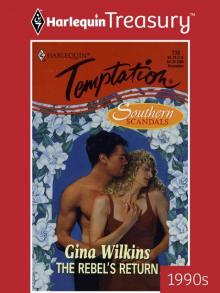 The Rebel's Return
The Rebel's Return Husband for a Weekend
Husband for a Weekend Healed with a Kiss
Healed with a Kiss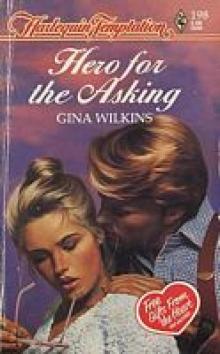 Hero For the Asking
Hero For the Asking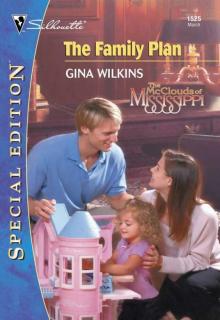 The Family Plan
The Family Plan In High Gear
In High Gear It Takes A Cowboy (Heart Of The West #5)
It Takes A Cowboy (Heart Of The West #5)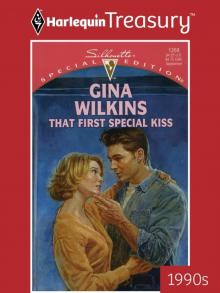 That First Special Kiss
That First Special Kiss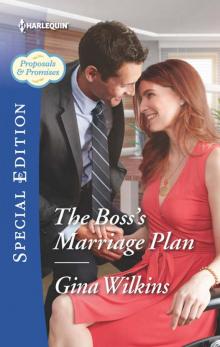 The Boss's Marriage Plan
The Boss's Marriage Plan The Doctor's Undoing
The Doctor's Undoing The Texan's Tennessee Romance
The Texan's Tennessee Romance A Match for Celia
A Match for Celia The Texan's Surprise Baby
The Texan's Surprise Baby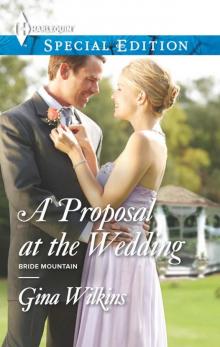 A Proposal at the Wedding
A Proposal at the Wedding Hearts Under Caution
Hearts Under Caution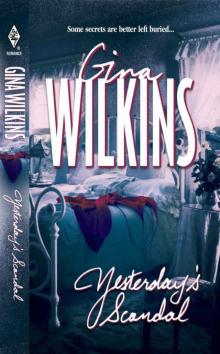 Yesterday's Scandal
Yesterday's Scandal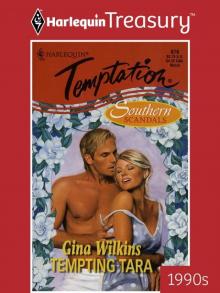 Tempting Tara
Tempting Tara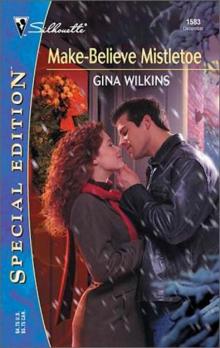 Make-Believe Mistletoe
Make-Believe Mistletoe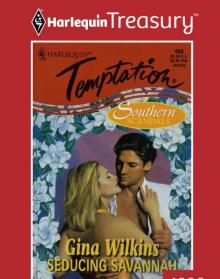 Seducing Savannah
Seducing Savannah The Man Next Door
The Man Next Door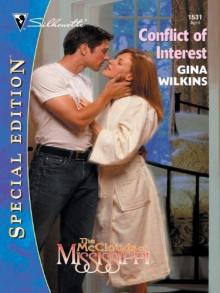 Conflict of Interest (The McClouds of Mississippi)
Conflict of Interest (The McClouds of Mississippi)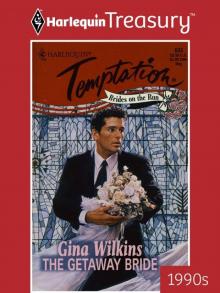 The Getaway Bride
The Getaway Bride A Reunion And A Ring (Proposals & Promises Book 1)
A Reunion And A Ring (Proposals & Promises Book 1)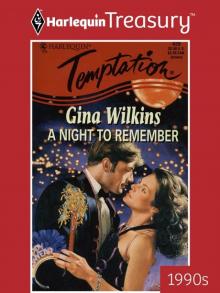 A Night To Remember
A Night To Remember Undercover Baby
Undercover Baby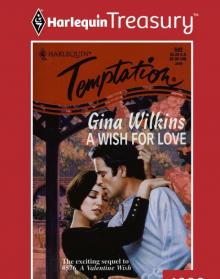 A Wish For Love
A Wish For Love Matched by Moonlight
Matched by Moonlight A Home for the M.D.
A Home for the M.D.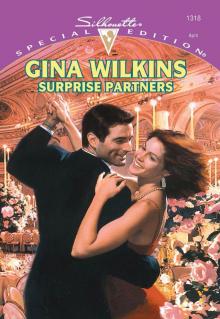 Surprise Partners
Surprise Partners Almost Famous
Almost Famous Adding to the Family
Adding to the Family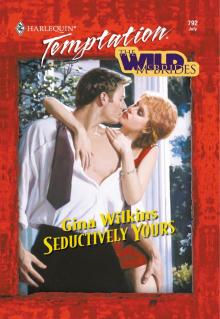 Seductively Yours
Seductively Yours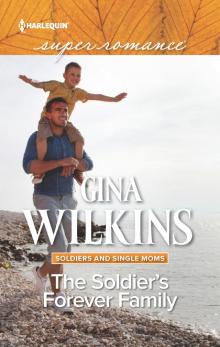 The Soldier's Forever Family
The Soldier's Forever Family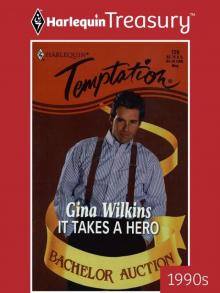 It Takes a Hero
It Takes a Hero Private Partners
Private Partners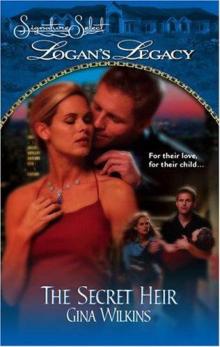 The Secret Heir
The Secret Heir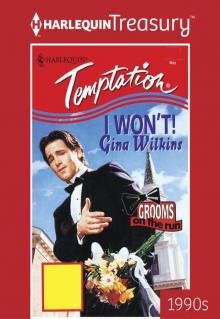 I Won't!
I Won't! The Right Twin
The Right Twin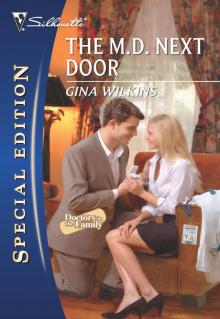 The M.D. Next Door
The M.D. Next Door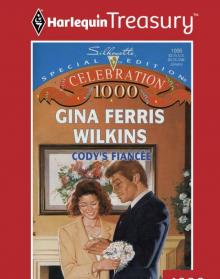 Cody's Fiancee
Cody's Fiancee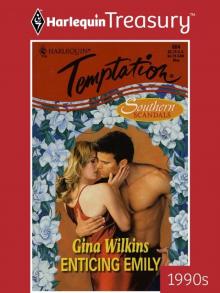 Enticing Emily
Enticing Emily Prognosis: Romance
Prognosis: Romance Countdown To Baby (Merlyn County Midwives #2)
Countdown To Baby (Merlyn County Midwives #2) Doctors in the Wedding
Doctors in the Wedding The Stranger In Room 205 (Hot Off The Press Book 1)
The Stranger In Room 205 (Hot Off The Press Book 1) Love Lessons
Love Lessons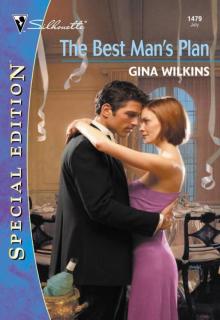 The Best Man's Plan (Special Edition)
The Best Man's Plan (Special Edition) Bachelor Cop Finally Caught? (Hot Off The Press Book 2)
Bachelor Cop Finally Caught? (Hot Off The Press Book 2) Date Next Door
Date Next Door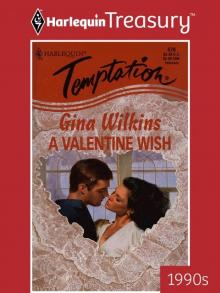 A Valentine Wish
A Valentine Wish Secretly Yours
Secretly Yours All I Want for Christmas
All I Want for Christmas The Road to Reunion
The Road to Reunion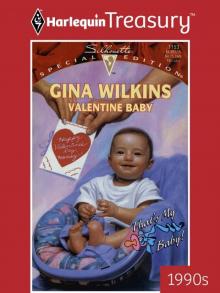 Valentine Baby
Valentine Baby His Best Friend's Wife
His Best Friend's Wife Diagnosis: Daddy
Diagnosis: Daddy The Groom's Stand-In (Special Edition)
The Groom's Stand-In (Special Edition) Her Very Own Family
Her Very Own Family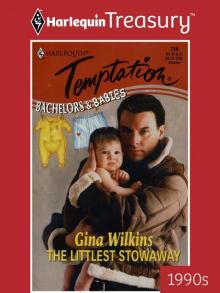 The Littlest Stowaway
The Littlest Stowaway